Photographs: Paresh Gandhi
Indian American Reshma Saujani hopes to become the next United States Congresswoman from New York. It is a difficult race to win the New York primary slated to be held on Tuesday, but she is counting on immigrant power and her Wall Street connections. Aseem Chhabra speaks to the candidate.
Last month, early one Saturday afternoon, Reshma Saujani arrived at a community club in the heart of the Bangladeshi neighborhood in Astoria, in the Queens borough of New York City. Against what would be most political pundits' advice Saujani has taken on a major task -- trying to unseat United States Congresswoman Carolyn Maloney, a nine-term incumbent in New York state's 14th Congressional District, which includes the heavily Democratic and wealthy Upper East Side, as well as parts of working class immigrant neighborhoods in Queens, along the East River.
 |
Saujani, 34, is a novice to the extent that she has never run a political race prior to this, although she has been involved in two significant presidential races. During the 2004 presidential elections, Saujani founded South Asians for Kerry. Four years later she served on the National Finance Board for Hillary Clinton's presidential campaign.
Before she spoke to the gathering of about 45 Bangladeshis and a couple of Sikhs, Saujani mingled with the group, and ate a meal of Indian-Chinese chicken and biriyani.
This group is important to her race, given that only 30,000 to 35,000 voters are expected to turn up on primary day to vote in the 14th, called Manhattan's silk stocking district.
Saujani needs an advantage over Maloney's name recognition in New York City. That day she was trying to reach out for the support of approximately 400 Bangladeshi voters in the district who backed Barack Obama in the 2008 presidential race.
"Only five percent of the federal earmarks that Congresswoman Maloney has gotten have gone to Queens," Saujani said as she sat down for an interview.
"The people of this district lack services. Their senior citizen centers are closing, after-school programs are cut. She doesn't represent Queens. Queens has not been a part of her passion and her leadership," Saujani said.
..
Her Wall Street friends have come out in a big way to support her
Image: To me this election is about getting endorsement from people and not politicians, says SaujaniSaujani is the daughter of Gujarati parents, the wave of Indian refugees who were expelled from Uganda in the early 1970s. Her parents fled Uganda leaving behind all their belongings and finally settled down in Chicago. She likes to tell that story in every political speech.
Saujani attended the University of Illinois at Urbana-Champaign for her undergraduate degree and did graduate work at the John F Kennedy School of Government at Harvard University. She later attended Yale Law School.
Her professional career has included work at the law firm Davis Polk & Wardwell and later at three hedge fund firms, including Fortress Investment Group.
Maloney, 64, is a liberal activist and the chairwoman of the House Joint Economic Committee and member of the House Financial Services Committee. Her work, in putting together the financial reform bill that President Obama signed a couple of months back, has made her unpopular with many on Wall Street.
But she has the backing of most of the city's Democratic establishment, including the Democratic Clubs that make the backbone of the party's existence. Saujani's division from the New York Democratic Party establishment is evident in her calling for the resignation of embattled Harlem Congressman Charlie Rangel.
Saujani raised a lot of money for Senator Kerry's presidential race, and yet he has not backed her against Maloney, the inside party candidate. "I actually haven't asked him," Saujani said rather quickly, when asked about Kerry's endorsement.
"To me this election is about getting endorsement from people and not politicians. And as for Hillary it is illegal to support me," she said.
Saujani decided to run for the 14th Congressional District when Maloney briefly considered challenging the state's junior Senator Kirsten Gillibrand. Maloney did not pursue that goal, but Saujani, who lives in the 14th District, consulted with friends and announced her candidacy. When asked whether she discussed her decision to run with Kerry or Clinton, she responded by saying "No comments!"
But she added that she had the endorsement of Kerry's stepson Chris Heinz. A couple of weeks ago Heinz hosted a fundraiser for Saujani. The guest list also included new age guru Deepak Chopra.
Saujani's Wall Street friends have come out in a big way to support her. According to one report her campaign has raised $1.2 million, with $300,000 coming from the financial services industry. Maloney has raised more than $2.5 million for her re-election.
Saujani has the backing of Goldman Sachs President Gary Cohn, Morgan Stanley board Chairman John Mack and Judith Dimon, wife of JP Morgan CEO Jamie Dimon.
She also has the support of Cathy Lasry, wife of billionaire hedge fund manager Marc Lasry; Maureen White, former Democratic National Committee finance chairwoman and wife of investment banker Steve Rattner; Jack Dorsey, co-founder of Twitter; Chris Hughes, co-founder of Facebook; and Randi Zuckerberg, director of market development for Facebook and sister of the social media site founder.
She has been criticised for her Wall Street connections
Image: Saujani does a walkabout through the working class immigrant neighbourhoods of QueensPhotographs: Paresh Gandhi
Given all this high profile support, Saujani has been subject to several damaging news reports where she has been again and again labeled as a Wall Street candidate.
In early July MSNBC talk show host Chris Matthews had Saujani as a guest where he was sharply critical of her Wall Street connections. Recently a Village Voice blog carried a negative piece detailing Saujani's hedge fund industry contacts.
"Having spent the last five years at three hedge funds that blew up in scandal or speculative overdrive, Saujani insists she should represent Manhattan's East Side and parts of Queens in the House on the strength of a bio that features felons and foreclosures," the Voice blog had said.
"I think it is unusual for a woman running in a Democratic primary to have the financial services background," Saujani said in her defense. "But I can tell you that a significant amount of money I got is from the Wall Street desi community. When you run for office, you go to your friends and your family. I have very good friends who work in the financial services industry who are South Asian. If I was a doctor, I would have gone to doctors. But this allegation is also silly. We have thousands of people contribute to our campaign from all walks of life," she said.
"If you contest from New York's Upper East Side, then you are bound to have connections with Wall Street," said Shekar Narasimhan, co-chair of the Indo-American Council at the Democratic National Committee and a supporter of Saujani's candidacy.
He added that Maloney also had backers who are engaged in the financial services industry.
Otherwise Saujani's position on controlling Wall Street is in line with that of Maloney and the White House. "I believe in the financial services bill and that we need transparency and accountability in Wall Street," she said.
'We were the first to come out in support of the NY mosque'
Image: People are going to give to a candidate because they believe in them, say Saujani's backersPhotographs: Courtsey: Megha Desai
Saujani understands the aversion some people have to Wall Street. "Two years ago it wouldn't have mattered if I was a lawyer working in the financial services firm," she said. "But there is a lot of anger towards what happened and she (Maloney) has made a big deal about my resume."
Some critics of Saujani have pointed out that her efforts to raise money, given that her chances of winning are said to be not strong, have denied crucial funds for other deserving Indian-American candidates in races across the US.
"All the South Asian candidates call the same donors that I called and every donor has the right to make a choice," Saujani said. "And even if I wasn't running that doesn't mean that they would have given the money to another candidate. They may not have given the money to any of the other candidate," she said.
Narasimhan backed this argument. "People are going to give to a candidate because they believe in them, they have a connection with him or her," he said, suggesting that Saujani's donors liked her and hence they were supporting her.
For several months into this campaign Maloney did not even acknowledge Saujani. Finally about a month ago Maloney's campaign mailed out flyers to her constituents attacking her opponent by name.
"Which means her internal poll numbers aren't looking good," a confident Saujani said. "That's the only time you go negative, because you do not want to spend $80,000 giving your opponent name recognition. That is what she did. She referred to me by my name and also had my picture there."
Saujani's campaign pressured Maloney for a debate. "I do not know Congresswoman Maloney's views on lots of things," she said. "I don't know what her views are on the DREAM Act, on immigration reform. I haven't seen her talk recently about Afghanistan. We were the first to come out in support of the mosque issue. It took weeks for others to follow and stand up for religious freedoms in this country," she noted.
'Maloney is not entitled to the NY seat'
Image: If I lose, I will run again the same race the day after the primaries, says SaujaniPhotographs: Paresh Gandhi
"Congresswoman Maloney should debate us because she's not entitled to that seat," Saujani said at the Astoria event. "That seat is not hers. New Yorkers have the right to hear her views on all issues that are so critical."
The Maloney campaign ignored the request until a local televison reporter cornered Maloney and finally she had to agree. The two were scheduled to have a radio debate on September 7.
Initially Saujani's campaign criticised the idea of a mid-day radio debate when most potential listeners would be at work. Later her office changed its position saying: 'This is a victory for all New Yorkers, who deserve the opportunity to hear and see the candidates debate. We will work to ensure that everyone has access to the debate, even if they can't listen live.'
Maloney agreeing to the debate is already a victory for Saujani, Narasimhan said. "As a first time candidate she is trying her best," he added.
The New York primary is scheduled for September 14. Narasimhan noted that whether she wins or not, Saujani had already made a name for herself in New York City's political landscape.
In case Saujani loses the race she intends to continue where she started. "If I lose, I will run again the same race the day after the primaries," she said.
"It will not happen -- but if it does, it will be with such a small margin that it will still be a mandate for us. I'm going to have to find a job that will pay my rent. I worked so hard to pay my loans and to get my family to a good position so I could take this step and I have no intention of going back. I want to represent the 14th District, period," she added.

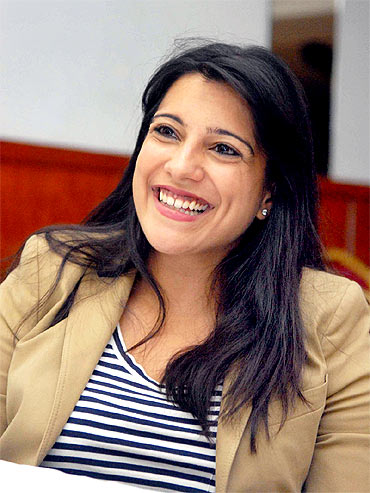
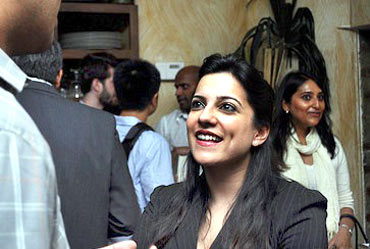
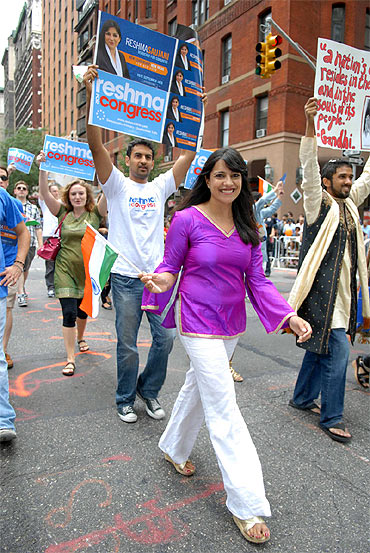
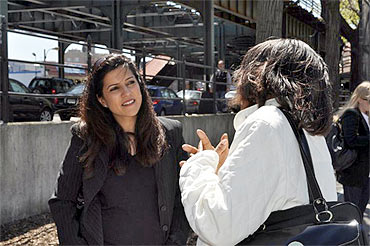
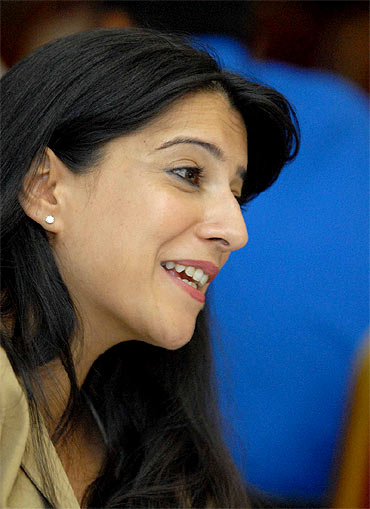
article